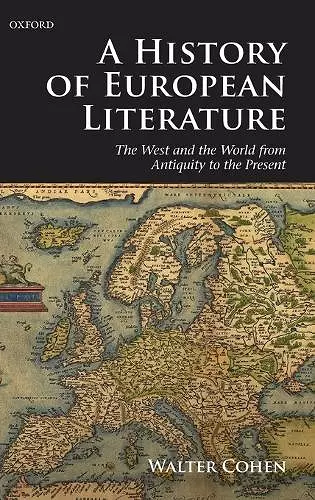A History of European Literature
The West and the World from Antiquity to the Present
Format:Hardback
Publisher:Oxford University Press
Published:2nd Feb '17
Currently unavailable, and unfortunately no date known when it will be back

Walter Cohen argues that the history of European literature and each of its standard periods can be illuminated by comparative consideration of the different literary languages within Europe and by the ties of European literature to world literature. World literature is marked by recurrent, systematic features, outcomes of the way that language and literature are at once the products of major change and its agents. Cohen tracks these features from ancient times to the present, distinguishing five main overlapping stages. Within that framework, he shows that European literatures ongoing internal and external relationships are most visible at the level of form rather than of thematic statement or mimetic representation. European literature emerges from world literature before the birth of Europe -- during antiquity, whose Classical languages are the heirs to the complex heritage of Afro-Eurasia. This legacy is later transmitted by Latin to the various vernaculars. The uniqueness of the process lies in the gradual displacement of the learned language by the vernacular, long dominated by Romance literatures. That development subsequently informs the second crucial differentiating dimension of European literature: the multicontinental expansion of its languages and characteristic genres, especially the novel, beginning in the Renaissance. This expansion ultimately results in the reintegration of European literature into world literature and thus in the creation of todays global literary system. The distinctiveness of European literature is to be found in these interrelated trajectories.
It is hard to do more than confirm in new ways the duly earned praises that others have already heaped upon Cohen's book ... it is the way Cohen integrates Slavic literature into his general model of borrowing, invention, and globalization that makes it particularly valuable to Slavicists. * Russell E. Martin, Canadian-American Slavic Studies *
Cohen, with extraordinary erudition, places European literature from the Romans onwards alongside extra European literatures. His book bulges with fascinating detail. The local provenance of Roman authors; the interplay among medieval vernaculars that shaped the lyric and the romance; the constant presence of the Mediterranean in Shakespeare; fiction on the European peripheries (Dostoevsky, Melville, Machado de Assis); the transformative Jewish presence in modernism - these are just a few of the high spots. A bird's eye view of genres alternates with illuminating close readings: Horace's "Nunc est bibendum", Hamlet, Moby-Dick, Pale Fire. This amazing book is a counterpart to Auerbach's Mimesis for the globalized present. * Times Literary Supplement *
this monograph is a timely intervention, which emphasizes the enduring significance of European culture within a wider context without shying away from its troubled history. Cohen succeeds admirably in delineating and magnifying the story he sets out to tell -- one version of events, to be sure, but a compelling and insightful one. His championing of comparative literary criticism that pays attention synchronically and diachronically to the formal properties of languages in literary works is also welcome. * Ian Ellison, Modern Language Review *
Cohen's erudition is nothing short of impressive. His account of the complex interrelations between literatures through this vast territory, before the vernaculars and across languages, and also later in the Middle Ages into the Renaissance, maps out a huge landscape, and the list of texts he considers is enormous. Most importantly, the general overview is underpinned by thorough analyses ... The book is an admirable encyclopedic one-man show, but it also shows that all-encompassing histories today can only be carried out as teamwork, across languages and, to a certain extent, across disciplines ... it deserves a prominent place on a comparatist's book shelf. * Svend Erik Larsen, Comparative Critical Studies *
A lifetime of extensive and wide reading, coupled with a fine and sharp critical judgement, go into the making of a book that is certain to remain without match for a while [...] Monumental and erudite without ever becoming precious or obscure, firmly grounded historically but completely enmeshed in theoretical discussions, Cohen's book will stand the test of time like the works of the great critics he lists at the end: Lukacs, Curtius, Auerbach, Spitzer, Adorno and a few others. As a great study of European literature, it could not have come at a better or more appropriate time, as such wide vision is much in demand for a reconceptualization of Europe turned imperative. For the present it makes for engaging, provocative and pleasurable reading, as much as it also points the way forward. * Journal of European Studies *
This books achievement lies in substituting challenging possibilities in place of over-familiar constructs. * Osman Durrani (University of Kent), The Modern Language Review *
A History of European Literature triumphantly demonstrates the continuing conceptual force and argumentative power of the single-author monograph. Its more contentious claims will only help this magnificently ambitious book to stimulate debate for decades to come. * Ben Hutchinson, Times Literary Supplement *
Cohen, with extraordinary erudition, places European literature from the Romans onwards alongside extra European literatures. His book bulges with fascinating detail. * Ritchie Robertson, Times Literary Supplement *
ISBN: 9780198732679
Dimensions: 241mm x 161mm x 38mm
Weight: 1018g
626 pages